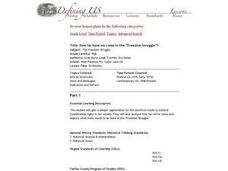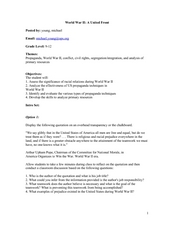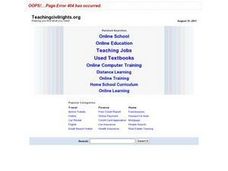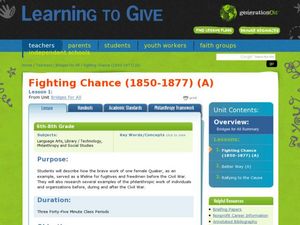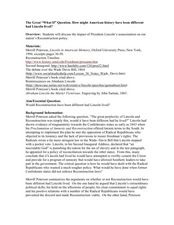Curated OER
How far have we come in the "Freedom Struggle"?
Eleventh graders assess an appreciation for the sacrifices made to achieve fundamental rights in our society. They analyze how far we've come to explore what more needs to be done in the "Freedom Struggle." Each student completes a...
Curated OER
Making Democracy Work for Everyone, 1877-1904
Students investigate the culture of the post Reconstruction South. They participate in a jigsaw research activity, conduct Internet research on an assigned topic, and write a report to present to the class.
Curated OER
World War II: A United Front
High schoolers interpret historical evidence presented in primary resources. In this World War II lesson, students examine racial relations during the war and then examine propaganda techniques employed by the United...
Curated OER
CIVIL DISOBEDIENCE
Young scholars use events of the time to illustrate the significance of the 1965 Selma-to-Montgomery Voting Rights March.
Curated OER
Same Sex Marriage Legislation
Learners explore the Vermont legislation that allowed for same sex marriages. The implications for civil rights are investigated to encourage students to state opinions.
Curated OER
A Look at Virginians During Reconstruction
Fourth graders examine slavery and Reconstruction in Virginia. In this Virginians during Reconstruction instructional activity, 4th graders research primary sources for the story of William Jasper and other slaves. Students hypothesize...
Curated OER
"I have a Dream"
Students analyze the famous "I Have a Dream," speech by Martin Luther King Jr., and discuss the progress made since then. In small groups, they read and discuss various documents, and formulate a plan of action to help realize Dr. King's...
Center for History and New Media
Growing Up in a Segregated Society, 1880s–1930s
What did segregation look like in the beginning of the 20th century? Middle and high schoolers view images of segregated areas, read passages by Booker T. Washington and W.E.B. DuBois, and come to conclusions about how the influence of...
Library of Virginia
Antebellum Freedom
From indentured servitude to involuntary race-based servitude, slavery has taken many forms in American history. Class members examine three manumission petitions that reveal how the rights of African Americans and African American...
National Endowment for the Humanities
A Raisin in the Sun: Whose "American Dream"?
How does Lorraine Hansberry's A Raisin in the Sun factor into a discussion of the American dream? High schoolers define the American dream and recognize the historical setting of the play. Additionally, they identify forms of...
Curated OER
Rationalizing Race in US History
Students consider the classification of people. In this race studies lesson, students examine the concept of race as it relates to U.S. history and trends. Students research racial discrimination and prejudice in order to support their...
Facing History and Ourselves
Violence and Backlash
Revolution and counterrevolution. Protest and counter-protest. Collaborators and bystanders. The focus of the fifth resource in the Reconstruction Era and Fragility of Democracy series is on the political violence that followed Radical...
Facing History and Ourselves
The World the War Made
The United States Civil War forced Northern and Southern societies, as well as the people who made up those societies, to reconstruct their vision of themselves and their identities. A series of video-based web lessons look at the great...
Curated OER
Looking for Heroes
Pupils explain the importance of the 1965 Selma-to-Montgomery Voting Rights March and the long term impact in the US of non violent civic participation.
Curated OER
Dinosaurs Were Real!
Students investigate the history of dinosaurs, as real animals. In this dinosaur lesson plan, students examine basic concepts that help them understand the history of all life. Included in this article is information on the world of the...
Curated OER
African Americans in the Maritime Trades
Students explore Civil Rights by analyzing U.S. history. In this African American workforce lesson plan, students discuss the history of African Americans in Baltimore and the need for steady work that formed. Students define vocabulary...
University of California
Anti-Communism at Home
Have you ever been accused of something without cause? The sixth installment of an eight-part series asks scholars to create a museum exhibit on the anti-communist activities in the United States at the start of the Cold War. To make...
Curated OER
Court Documents Related to Martin Luther King, Jr., and Memphis Sanitation Workers
Young scholars read about the civil rights movement in their textbooks. They engage in a whole-class discussion of how nonviolent direct action can be a powerful tool for bringing about social, economic, or political change.
Curated OER
Bridges for All
Students describe how the brave word of one female Quaker served as a lifeline for fugitives before the Civil War. In this research lesson, students research several examples of the philanthropic work of individuals and organizations...
Curated OER
Constitutional Resources
Pupils explore the REpublican Era and the writing of the constitution and Billof Rights through various links and activities included in this collection.
Curated OER
A Lesson on Reconstruction Legislation and Amendments
Young scholars study the legislation and Amendments of Reconstruction period in America. In this Reconstruction lesson, students work in groups to dissect the Black Codes, an article in the US Constitution, as well as the 13th, 14th, and...
Curated OER
Fugitive from Labor Cases:
High schoolers examine the cases of Henry Garnett and Moses Honner, both of the 1850s. Students analyze the political climate building up to the Civil War through the lens of these similar cases with different outcomes.
Curated OER
Give Peace a Chance
High schoolers research protest songs of the Vietnam War era. They search for information on the artists and motivation for the lyrics. They interview people who remember the music from that era and bring back information they found.
Curated OER
The Great "What If" Question. How might American history have been different had Lincoln lived?
Eleventh graders study the Presidency of Abraham Lincoln. In this American History lesson, 11th graders analyze documents related to Reconstruction. Students participate in a debate on Reconstruction.


